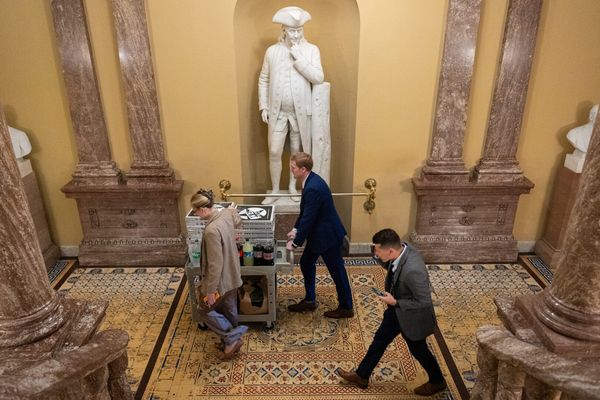
The adage that government gives with one hand while taking with another applies Saturday, as low-wage workers get some help, while anyone buying gas or groceries must pay a little more.
In Chicago and many suburbs, higher minimum wages kick in under terms of Chicago and Cook County ordinances.
At the same time, a slight reprieve state lawmakers gave consumers because of high inflation expires. The state’s 1% tax on groceries returns after a one-year suspension.
Also, the state’s gasoline tax on regular-grade fuel rises by 3.1 cents a gallon, to 45.4 cents. The tax on diesel fuel goes up 3.1 cents to 52.9 cents a gallon. The increases are mandated by state law.
All the changes take effect Saturday.
The situation with the minimum wage is complicated because rates can differ by locality and whether the job includes tips. Laura Garza, worker center director at the pro-labor group Arise Chicago, advised low-wage staff to “check their check” to make sure they are properly paid as of July 1.
Garza, joining Cook County Board President Toni Preckwinkle and other officials at a news conference Friday, said employers who pay less than required are committing wage theft. She said that for tipped jobs, employers must make up any shortfalls when wages fall below minimums.
“Worker pay is a racial justice issue, a gender justice issue and a health equity issue,” Garza said.
How much it will help low-wage staff is hard to guess because of the higher state taxes on gas and groceries. Carol Portman, president of the nonpartisan Taxpayers’ Federation of Illinois, said temporary reductions in those levies last year were “a little bit gimmicky” and appeared timed to help Gov. J.B. Pritzker’s reelection.
“Any time a tax cut is made in an election year, you have to look askance at it,” she said.
Nevertheless, Portman also said the temporary cuts helped consumers when inflation was high and gas prices had soared.
Since then, inflation’s pace has moderated, and gas prices have fallen. AAA said the average price of regular gas stands at $4.22 in the Chicago area, compared with $5.73 a year ago.
In Chicago, the new minimum wage is $15.80 an hour for employers with more than 20 workers, and $15 for those with four to 20 workers. The old minimums were $15.40 and $14.50.
For tipped occupations in Chicago, the minimums are $9.48 for employers with more than 20 workers and $9 for those with four to 20 workers. The prior rates were $9.24 and $8.70.
All domestic workers, however, qualify for the $15.80 minimum, and higher rates are mandated for overtime.
In Cook County outside the city, a $13.70 per hour minimum, compared with the old rate of $13.35, applies in unincorporated areas and in suburbs that adhere to the county ordinance. The county’s tipped minimum wage is $8 versus the prior $7.80. Eighteen towns follow the ordinance, according to the Cook County Department of Human Rights and Ethics.
Among them are Berwyn, Dolton, Evanston, Oak Park, Skokie and Wilmette.
The department counts 117 suburbs that have opted out of the county’s minimum wage ordinance. A list is available on its website.
In those places and elsewhere around the state, the minimum wage is $13 an hour, $7.80 for tipped work. The rate is unchanged as of July 1.
Workers who believe they are being cheated on pay can file complaints with the Chicago 311 system or with the Cook County Commission on Human Rights.
Commenting on the gas tax hike, the right-wing Illinois Policy Institute noted that low- and middle-income families pay a higher share of their budgets to drive. Assistant Editor Dylan Sharkey said the increase, an automatic inflation adjustment, hits as many Illinoisans plan to travel for July 4.
“Lawmakers should be expected to hold public debates and then answer to voters when they want to raise taxes. Independence Day should be a time to celebrate America’s bravery, not be reminded of spineless political moves,” Sharkey wrote.







